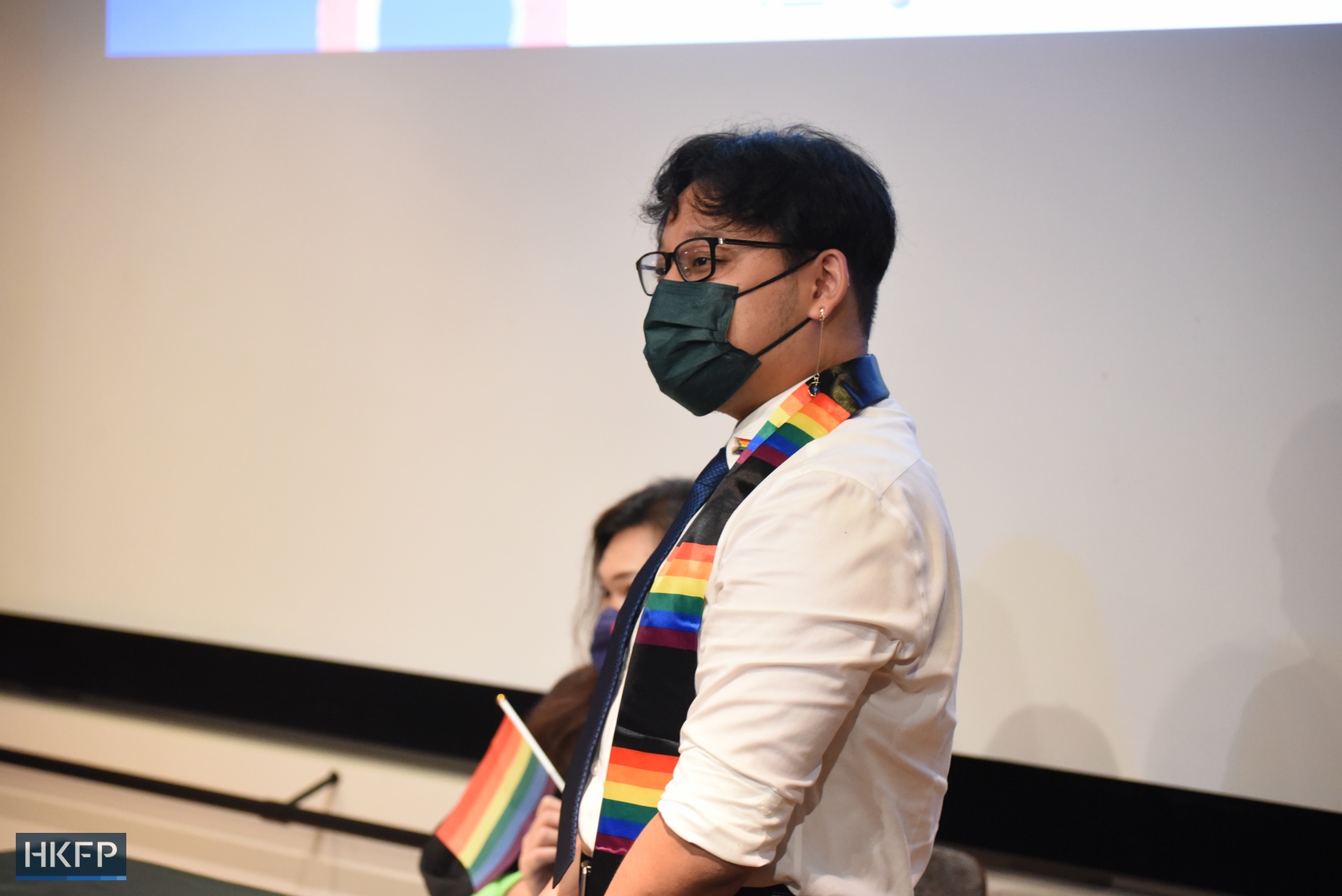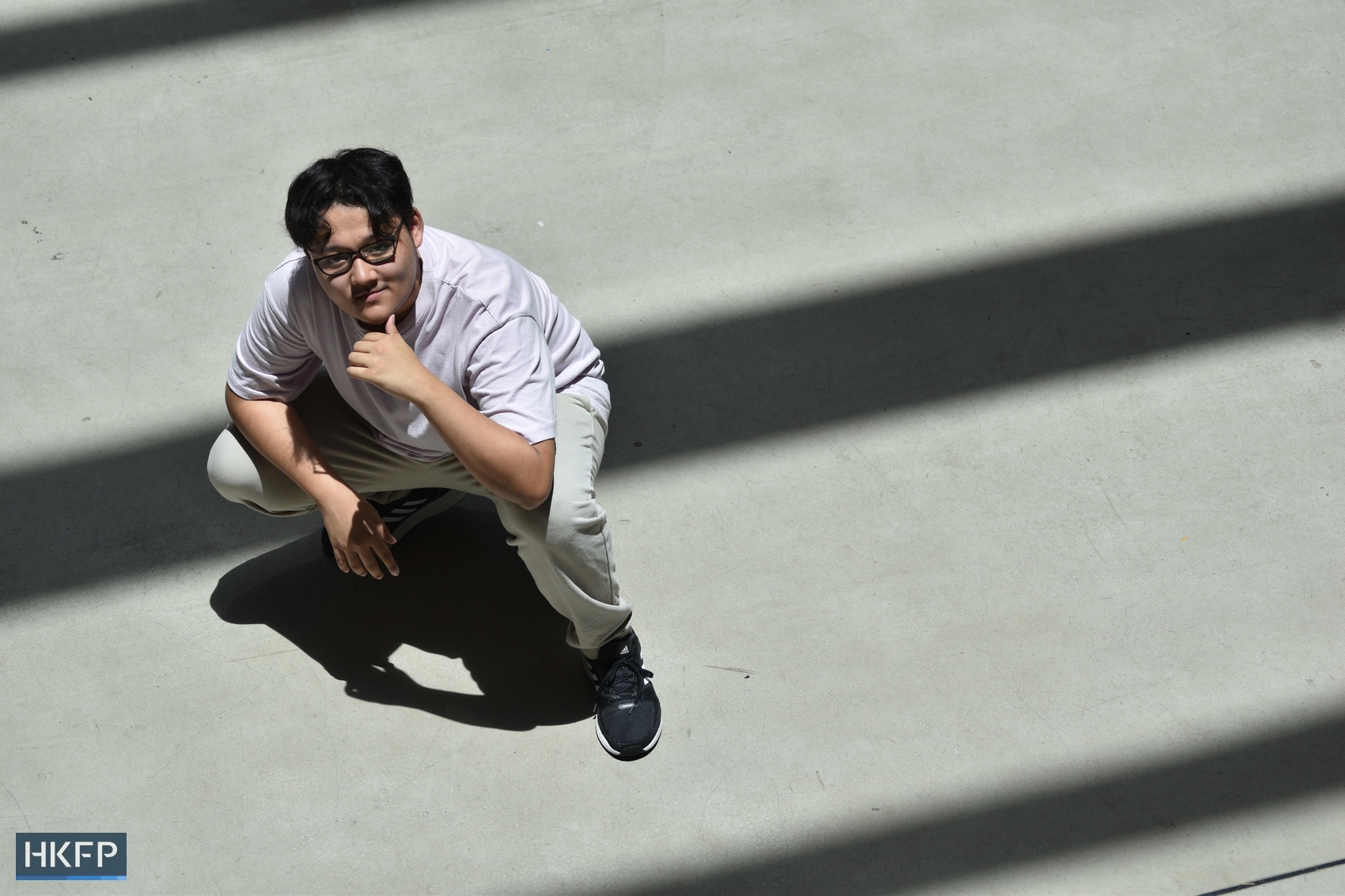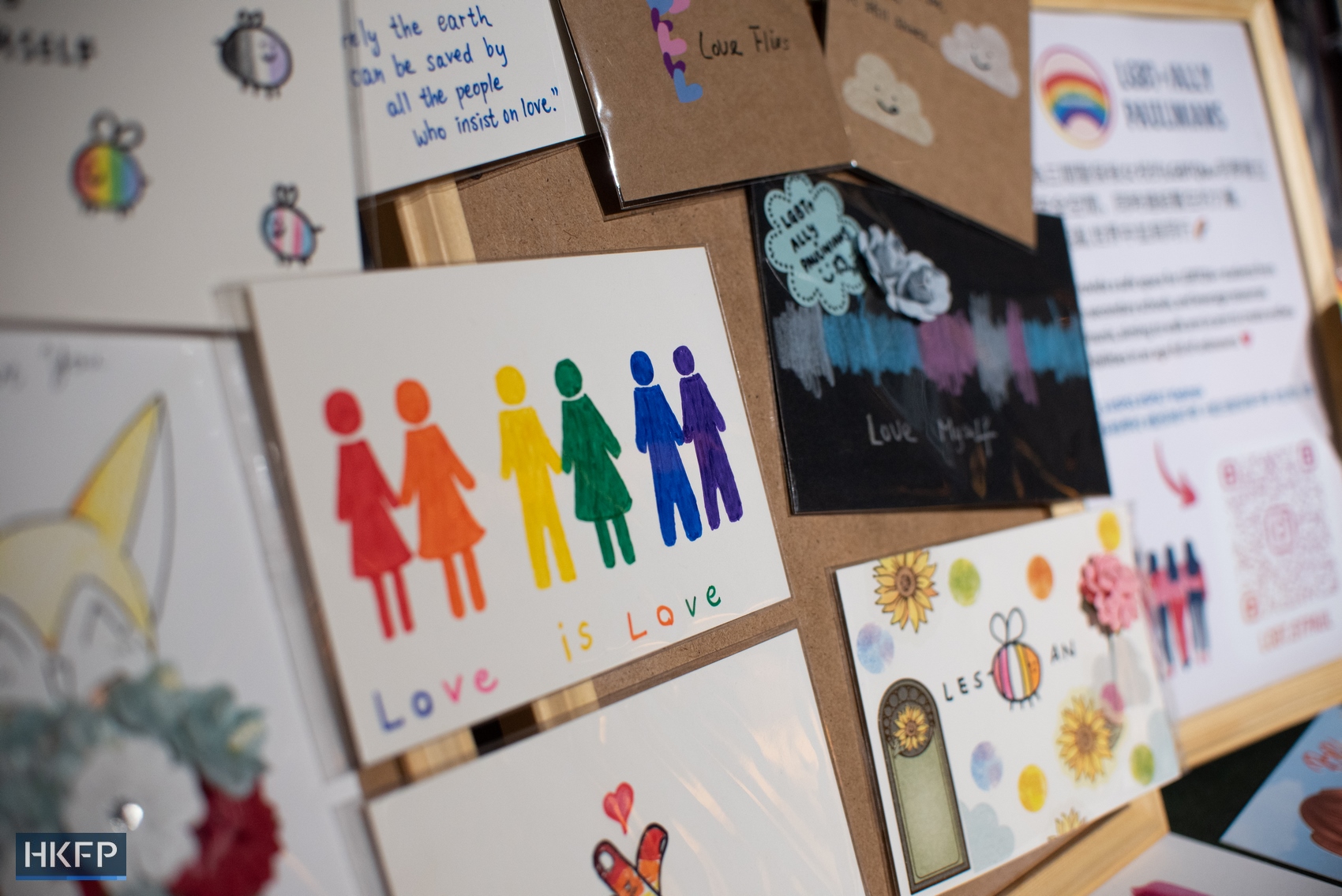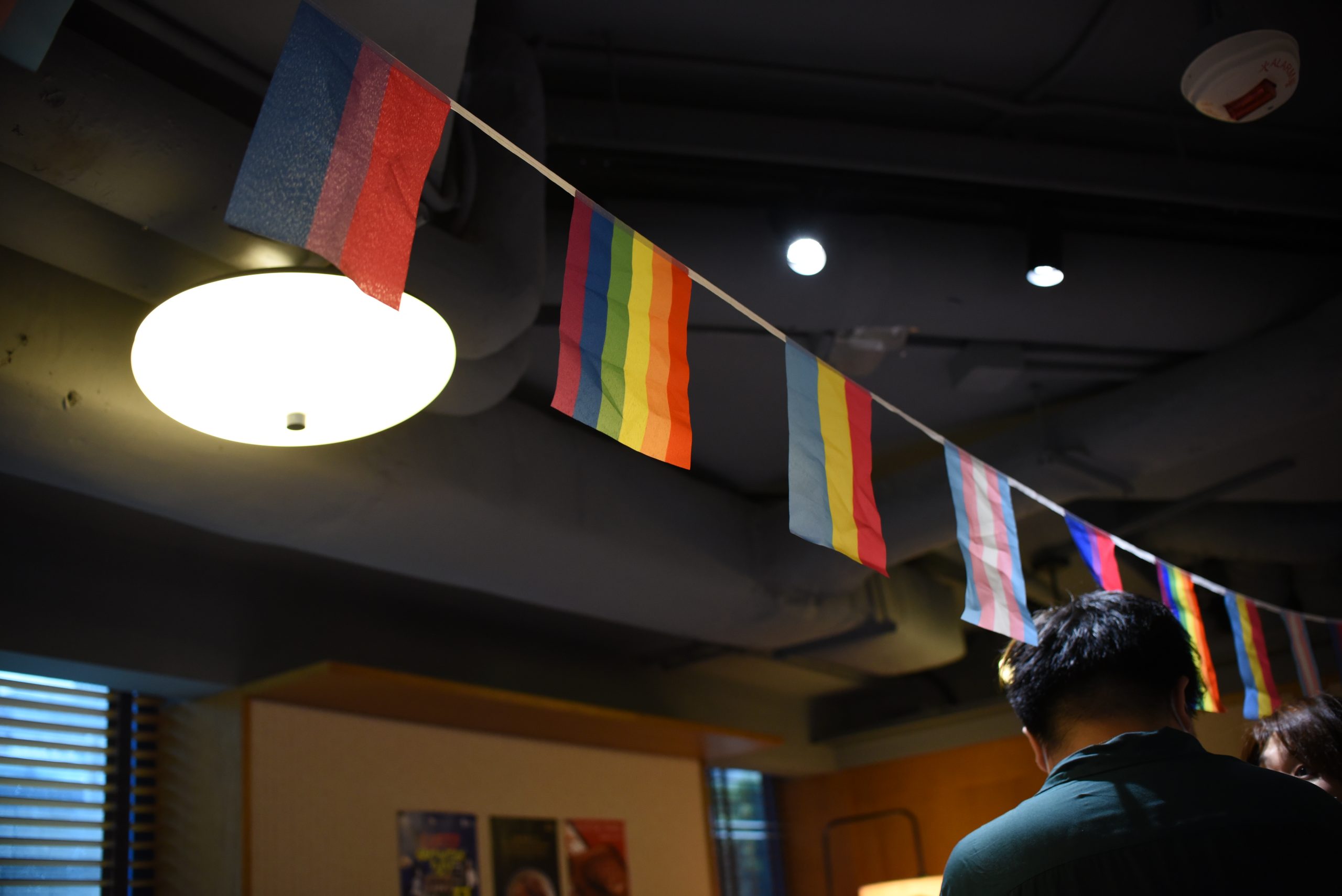On a gloomy, rainy Friday in Hong Kong, around 100 people were seated in an auditorium at a Yau Ma Tei hotel, patiently waiting for a ceremony to begin. Some were in suits and ties, some in vibrant floral print shirts with shiny accessories, as if seeking the limelight for the big day.
As the first guest gave a speech, followed by the second and third, the audience occasionally burst into laughter and clapped. The ceremony they had been waiting for would begin soon after the speeches ended.
“You will now receive the graduation blessing!” the master of ceremonies announced in a subtly excited tone. Graduates began to line up on the side of the stage, fixing their rainbow-striped sashes. Eighteen-year-old Debin Limbu was the first in line, ardently waiting for his name to be read out.
“Honourable president, I present to you the candidates for the secondary school category… Limbu Debin!” the host and organiser of The Rainbow Academy Queer Graduation Day said as she signalled Limbu to walk onto the stage.

Gay Games Hong Kong were behind the city’s first-ever queer graduation ceremony on July 1 – an outreach initiative, alongside LGBT groups Quarks and Queer Straight Alliance. The quasi ceremony was similar to the lavender graduation that originated in the US, which specifically honours LGBT and allied students. Hong Kong will co-host the games next year.
With his hands nervously clasped in front of his royal blue patterned tie, Limbu approached the stage, where the guest of honour sat beside a table draped with a rainbow flag. He gave a slight bow and had his head tapped with a pride flag.
Following Limbu was his schoolmate Alexandra Anselmo Sotto. Sporting short hair with a cat-ear headband, Sotto’s wide smile was visible even under a white surgical mask. On top of the rainbow sash, the 20-year-old, who identifies as either “she,” “he” or “they,” donned a rainbow scarf, putting their queerness on full display.

Limbu and Sotto’s friend Moira Daphne Gonzales Toledo took her turn later. Toledo, who goes by she/they pronouns, wore an oversized white shirt with a reddish-brown tie and loose grey trousers.

As the graduates walked the stage, the crowd clapped and cheered in a gesture of support for the ceremony.
Queer Graduation
Sonia Wong, the organiser of the graduation day, said she hoped to provide a platform for students to celebrate the milestone as their most authentic selves – dressed in the style they like and to be identified in a way they feel most comfortable. She said the event welcomed graduates of all levels and age groups.

For Limbu, Sotto and Toledo, who completed high school in June, the queer graduation felt liberating. The trio attended their own school’s graduation in mid-June, and were required to show up in regular school uniforms – boys in pants and girls in dresses.

Toledo said they used to struggle with gender dysphoria, which refers to the sense of unease caused by a mismatch of a person’s gender identity with their birth-assigned sex. However, it was not always possible to wear what they felt comfortable with in a school setting.

“It’s an internal feeling, and sometimes it fluctuates. Sometimes on certain days, you are like I don’t mind wearing a dress, it doesn’t feel bad. But on some days, it’s like ‘oh, no.’ But you can’t explain that to your teachers, like ‘Hey, can I not wear a dress today, I don’t feel like it.’ That sounds like an excuse. It really does,” Toledo said.
Sotto, who faced similar challenges, echoed Toledo. “When I went to school I’m like, I look good in this [dress] but at the same time, I don’t resonate with this person in the mirror.”
Minority within a minority
Apart from exploring their gender identity and sexuality, the high school graduates also reflected on their experience of being a minority within a minority. Sotto and Toledo are both Filipinos. Sotto arrived in Hong Kong five years ago and Toledo eight years ago. Limbu was born to parents of Nepalese descent and grew up in Hong Kong.

“Something about being queer, and an ethnic minority, makes you feel like you’re somehow different,” Toledo said, “When you’re in Hong Kong… the general population of ethnic minorities are already less than the locals, so when you add in the factor of queer, it’s like so much more less.”
The good thing though was they were able to find their peers more easily, which gave them the support system they needed when the school environment was not always accommodating. Limbu, who is gay, found it difficult at first to study at a local school that promotes traditional values. He first realised he liked men when he was 12.

“If you put someone who’s not really sure about their sexuality into a school with traditional values, especially towards men, where they value strength, they value this really twisted sense of pride to the point where if you hurt other people, you’re still regarded as a strong individual, as someone to look up to,” he said, “you really make yourself an easy target [for bullying].”
The teenager said he had encountered homophobic slurs at school because he did not like playing sports and was not passionate in joining conversations about “liking girls.”

Toledo, on the other hand, experienced pushback from teachers when trying to organise an activity for their fellow schoolmates to discuss LGBT issues.
“We had to convince a lot of teachers to let us even start posting up posters about our event… If I were organising some awareness talks on the environment, I could just easily post the posters, the teachers won’t get so mad about it.”
Traditional families
Families can be another battleground, with religion and traditional values added to the challenges as the queer teens fought for acceptance.
Limbu said his mother at first refused to believe he was gay even though he came out to her multiple times. “My mom was like, ‘I’ll only believe you’re gay after you’ve had sex with a girl and you tell me how you felt after doing that.”
Growing up in Hong Kong also did not help the Nepalese-Hongkonger avoid the pressure of agreeing to an arranged marriage.

“I think all ethnic minorities experienced this – it’s always about [arranged] marriage. It’s always about ‘When you reach 18, I’m going to find you a wife. I’m going to find you all these potential candidates that you can marry.’ That’s what my mom talks to me about,” Limbu said. The conversation began even before he came out.
“I would say ‘I will find my own woman.’ I will disguise it like that,” he said with a giggle, “So it started from me saying ‘No, mom I’ll find my own woman’ to ‘No, mom, I’ll find my own person,’ to ‘No, mom, I’ll find my own guy.’ So it was like a transition.”
His friends burst into laughter afterwards, applauding him for his courage in standing up to his parents.
For Sotto and Toledo, who spent the early half of their childhood in the Philippines, religion, or more specifically, Catholicism was a big part of their life – or at least of their family. Toledo said they used to be quite religious, but were somewhat unsure now.
“The reason why I even consider being agnostic is because of how the religious community treats gay people… I remember I used to pray to God… if being gay is really wrong, please tell me or please give me a sign. And then he didn’t say anything,” Toledo recalled.
Frustration turned to activism
Feeling frustrated at some school rules and the lack of acceptance on campus, the teenagers and their comrades turned to activism, hoping to make the school more inclusive. They succeeded in fighting for the option for students to wear the gender-neutral sports uniforms.

The graduates’ advocacy may also have inspired other current students to take on the fight, as some pupils tried to nudge the school to introduce subjects such as gender studies and sex education. Sotto said schools play a crucial role.
“Ethnic minority parents… their main priority is to provide for their children. They don’t have enough time to teach them homework or talk with them… Socio-economic factors really play into this as [the parents] are so busy putting food on the table that [they] don’t have time for this shit,” Sotto said.
It is also less common for ethnic minority parents to discuss topics such as sex, sexuality and gender identity with their children, they added.
The rainbow stays
The queer graduation, which was fairly informal to begin with, became a party as an LGBT-friendly choir began an energetic performance after all graduates had their moment on stage. The auditorium soon resembled a concert hall, with people dancing and enjoying a great time with a community that appreciated them as they were.



Even the announcement that typhoon number 8 signal had been hoisted did not interrupt the celebrations. Perhaps the rainbow would remain despite the weather.
Support HKFP | Policies & Ethics | Error/typo? | Contact Us | Newsletter | Transparency & Annual Report | Apps
Help safeguard press freedom & keep HKFP free for all readers by supporting our team

LATEST FROM HKFP
HKFP has an impartial stance, transparent funding, and balanced coverage guided by an Ethics Code and Corrections Policy.
Support press freedom & help us surpass 1,000 monthly Patrons: 100% independent, governed by an ethics code & not-for-profit.











